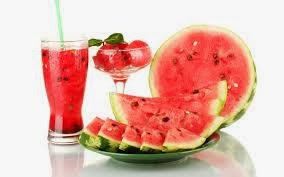Watermelon is an extremely popular fruit. While we all enjoy eating this sweet refreshing fruit, we usually discard the tiny seeds scattered in it without realizing or rather knowing of their health benefits. These seeds are loaded with nutrients including fatty acids, essential proteins and lots of minerals. These seeds are rich in vitamin B like thiamine, niacin, folate and minerals like magnesium, potassium, manganese, iron, zinc, phosphorus and copper. Besides, they are a great source of calories with 100 grams of watermelon seeds providing around 600 grams of calories.
Watermelon seeds are used in Asian and Middle Eastern cuisines. Roasted watermelon seeds are served as a snack or used to garnish salads. In Nigeria they are used in certain soups. Watermelon seed oil is extracted from these seeds which is beneficial for your hair and skin. To say the least, watermelon seeds are edible and can be a healthy option.
 Benefits of Watermelon for Men
Benefits of Watermelon for Men
Watermelon can help men fight prostate cancer, erectile dysfunction and hypertension.
Watermelon is not only a thirst-quenching fruit on a hot day; it can also help you stay healthy. Research shows watermelon to have many health benefits especially helpful to men. Packed with vitamins and minerals, watermelon can have several positive effects on the body.
Watermelon is an excellent source of potassium, vitamins C and A, and contains a high concentration of beta-carotene. Red watermelon rind also contains the phyto-nutrient citrulline, which has health benefits such as increased blood flow throughout the body. The inside of a watermelon is about 92 percent water. The remaining 8 percent has the highest concentration of lycopene found in any fresh fruit or vegetable. The health benefits of watermelon are abundant, especially for men.
Prostate Health
Researchers once believed that lycopene was only in tomatoes, but the watermelon holds the highest concentration of lycopene in any fresh fruit or vegetable. Lycopene has known antioxidant qualities to keep the skin, heart, and prostate healthy. In a study conducted by doctors at The University of Illinois at Chicago, test subjects ingested lycopene for three weeks before undergoing a scheduled prostatectomy. The results showed significantly diminished damage to the prostate tissue by the end of the three-week trial.
Erectile Dysfunction
Watermelon rind contains a high concentration of a phyto-nutrient called citrulline. Dr. Bhimu Patil, director of Texas A&M's Fruit and Vegetable Improvement Center, has researched citrulline, finding it to have several health benefits. One benefit is the ability to relax the blood vessels, much like drugs used to treat erectile dysfunction. When ingested, citrulline boosts nitric oxide levels, which relaxes blood vessels to increase blood flow throughout the body. While the cause of erectile dysfunction can involve a variety of psychological and physiological issues, an increase in blood flow can help in mild cases.
Lowers Blood Pressure
In a study conducted at The Florida State University, Professor Bahram H. Arjmandi found in giving watermelon extract to nine subjects with hypertension for six weeks, each showed lower blood pressure at the end of the study. The phyto-nutrient citrulline allows for increased blood flow in the body, which can help with hypertension. Figueroa also stated that patients could potentially ingest lower doses of antihypertensive drugs when paired with citrulline found in watermelon.
 The Health Benefits of Watermelon Seeds
The Health Benefits of Watermelon Seeds
When you think of the health benefits of watermelon, the seeds probably don't come to mind. You probably think about the sweet, juicy pulp, with the seeds an afterthought and maybe good only for spitting contests. The fact is, watermelon seeds make a great snack when they have been dried and roasted; the United States Department of Agriculture, lists several important nutritional components of watermelon seeds.
Protein
Watermelon seeds are very high in protein, with 1 cup of dried seeds containing 30.6g, which is 61 percent of the daily recommended value. The protein in watermelon seeds consists of several amino acids, one of which is arginine. While the body produces some arginine, MedlinePlus states that some health conditions may benefit from additional arginine. Some of the health benefits of arginine include regulating blood pressure and treating coronary heart disease. Several other amino acids make up the protein in watermelon seeds, including tryptophan, glutamic acid, and lysine.
B Vitamins
Watermelon seeds are also loaded with several of the B vitamins. The American Cancer Society reports that B vitamins are necessary for converting food into energy and other important bodily functions. The most prevalent B vitamin in watermelon seeds is niacin, with 1 cup of dried watermelon seeds containing 3.8mg, which is 19 percent of the daily value. Niacin is important for maintaining the nervous system, digestive system and skin health. Other B vitamins in watermelon seeds include folate, thiamin, riboflavin, vitamin B6 and pantothenic acid.
Minerals
Minerals abound in watermelon seeds. Magnesium is the most abundant mineral, weighing in with 556mg, or 139 percent of the recommended daily value, in 1 cup of dried seeds. According to the National Institutes of Health, magnesium helps regulate blood pressure and the metabolism of carbohydrates, which has a beneficial effect on blood sugar as well. Other important minerals in watermelon seeds are phosphorous, iron, potassium, sodium, copper, manganese and zinc.
Fats
The most surprising thing about watermelon seeds is the amount of fat they contain. In 1 cup of dried seeds, there are 51g of fat, with 11 of those being saturated fat. The other fats are monounsaturated fats, polyunsaturated fats, and omega-6 fatty acids. The American Heart Association reports that mono and polyunsaturated fats reduce blood cholesterol, and omega-6 fatty acids can help reduce high blood pressure. The down side of consuming a cup of watermelon seeds is the calorie count -- you'll take in just over 600 calories if you eat the whole cup.
Hope the article was informative. Please leave us a comment.


No comments:
Post a Comment